The Affair Read online
Page 2
Scott sensed a certain jealousy from these raddled old hacks, who had worked their way up from junior copy-taking roles on local rags to reach the height of their careers as Italian correspondents for national papers back home. It was a posting they felt they had earned after long years of covering rodeos and manning the obituaries page, so it would hardly be surprising if they resented the fact that Scott had walked straight into the role from college, with only a Harvard degree in international relations and several pieces in the Harvard Crimson to recommend him. Granted, he wasn’t working for The New York Times or the Washington Post. His paper, the Midwest Daily, was a respectable middle-market title, popular with farmers in the Bible Belt, but it was still a prestigious place to start his career. He didn’t tell the others that the job had been offered after a phone call from his father, who owned a substantial stake in the business.
Scott had arrived in Rome in May and the first thing he did was buy himself a Vespa, a pair of Ray-Ban sunglasses and some black cotton turtlenecks. He wanted to be like the ultra-cool character played by Marcello Mastroianni in La Dolce Vita, seducing beautiful women all over town and fêted by the famous for the exposure he could get them, while at the same time filing serious, important stories that would win the admiration of his peers. So far the reality hadn’t quite lived up to the image. In fact, he’d failed to get a single story in print since his arrival two months earlier, something the hacks hadn’t hesitated to tease him about the previous evening.
‘Had all your stories spiked, then? We should call you “Spike”. What do you reckon, boys?’
They’d all joined in. ‘Pass the ashtray, Spike.’ ‘Fancy another shot, Spike?’
When he read his compatriots’ stories, about the strange allegiances between Italian political parties or impenetrable agriculture statistics from the south of the country, he had to suppress a yawn. Maybe that’s what he should be doing, but he couldn’t write stories like that because he didn’t have the contacts. He’d expected to find a well-staffed office full of people who would set up interviews for him. All he’d have to do would be turn up, ask some insightful questions, and scribble off his piece. Instead, his only colleague was a middle-aged Italian woman who answered the phone and typed his correspondence. His predecessor, a journalist called Bradley Wyndham, had left without passing on any contact numbers or advice and it was entirely up to Scott to make his own way.
‘Did any of you guys know Bradley Wyndham?’ he asked the hacks, and they all said they’d met him but didn’t know him well.
‘Believe it or not, he was teetotal,’ someone commented, incredulous. ‘A journalist who doesn’t drink is like a shark that doesn’t swim. He wrote some decent stories but he wasn’t one of us.’
‘Maybe he had a health problem,’ Scott suggested. ‘Or maybe he was religious.’ No one seemed to have any personal information about Bradley Wyndham or know why he had left Rome so abruptly.
One of the hacks, a man named Joe, started quoting his ‘best friend’ Truman Capote: ‘Truman said “I don’t care what anyone says about me, so long as it isn’t true.” Isn’t that hilarious? When you’re with Truman, you get the urge to take out your notebook and write down what he says because he comes out with the most amazing things from thin air.’
‘Yeah, but then he repeats them to anyone who’ll listen for the next ten years,’ another hack drawled. ‘He’s never minded quoting himself.’
Scott was sceptical about Joe’s friendship with Truman Capote. Surely the fêted New York writer would mix in more rarefied circles?
Sitting in the café the morning after their drinking session, Scott mused that maybe Rome wasn’t the right posting for him. There simply wasn’t anything he could write about. He wished he had been sent to Berlin, where a wall was being constructed to separate the Russian and American halves of the city and people were making daring last-minute dashes across before it was too late. Or the USSR, where Khrushchev was boasting of Soviet nuclear weaponry and the fact they’d taken the lead in the space race. Or Israel, where Adolf Eichmann was on trial for war crimes. Though at least he wasn’t in Vietnam, where the CIA-backed Southern Vietnamese were being pushed back by the Viet Cong. That all sounded a bit hairy. He didn’t fancy the danger and discomfort of a conflict zone.
At ten-thirty, the door of the building opposite opened and a stunning young Italian girl emerged, as she did every day at that time. It was the reason why Scott frequented that particular café, several streets away from his office. The girl had wave after wave of glossy-black hair and the prettiest face he’d ever seen: heart-shaped, with high cheekbones and melting chocolate eyes. She wore old-fashioned summer dresses in pale sherbet colours, tied with a sash round the waist and reaching modestly to well below her knees. Sometimes when the sun was behind her Scott could see the outline of her hips and legs through the fabric. Since he’d first set eyes on her, he’d been hopelessly smitten. His heart actually skipped a beat when she stepped out of her house each morning.
She was carrying a basket, and he knew that she was on her way to the market for provisions but that she would stop in a church to say mass. He’d followed her a few times and the routine was always the same.
She crossed the road and as she passed in front of the café, Scott called ‘Buongiorno, signorina bella!’
She nodded in his direction and gave a quick, nervous smile, without stopping.
He’d been greeting her most mornings for over a month now and was pleased that at least she now acknowledged him, although she hadn’t yet returned the greeting. What were the chances that one day she might agree to go on a date? He fantasised about sitting across a candlelit table, wooing her in his best Italian, and then managing to kiss her in a dark side street as he walked her home. That was as far as the fantasy would stretch. You’d never get a girl like that into bed without marrying her and he wasn’t prepared to go that far. But Scott liked a challenge and there was no doubt this girl presented a challenge.
He decided to make it his mission to get a date with her before the end of the summer. He was single. She wasn’t wearing a wedding ring or any jewellery apart from a gold crucifix on a chain round her neck. What harm could it do? And if it came off, he’d have to get a photograph of the two of them to show his buddies back home; otherwise they’d never believe he could attract such a stunner.
Chapter Three
Diana arrived in Rome’s Leonardo da Vinci airport on the 25th of September and collected her suitcase from a pile in the arrivals hall. She’d been told that someone would be there to meet her and that they’d be holding a card with her name on it, but she couldn’t see any such person. It was a scorching day and she wished she hadn’t worn her winter coat, but there hadn’t been room for it in her suitcase. She took it off and folded it over her arm. Several taxi drivers approached, competing for her attention, but she waved them away. Her driver was probably stuck in traffic and running late.
As she waited, the arguments of the past few weeks echoed around her head. Trevor was right: she must be a very self-centred person. She knew she was being a bad wife. She knew she was letting him down. Their discussions had got increasingly bitter as each became entrenched in their positions. She couldn’t contemplate turning down the opportunity to work on the film but Trevor had taken it personally, as if it meant she didn’t love him enough. She tried every argument but he simply reiterated that he couldn’t manage without her, that he’d miss her too much.
They had barely spoken since she booked her flight. He was so hurt he couldn’t even look at her, and she was terrified that she might have damaged her marriage irrevocably. Surely Trevor wouldn’t divorce her? They didn’t know any divorcees among their social set, or even at the university. What would she do if he decided to take that extraordinary step? She’d given up a secure, ordered life for the complete unknown, and it seemed emblematic of the chaos she could expect that no one had arrived to meet her at the airport. She stood amongst the taxi dri
vers in the bustling entrance hall wondering if she had just made the biggest mistake of her life.
After hanging around for half an hour, she changed some money at an exchange bureau. They told her she needed gettoni for the payphone so she purchased some and used them to call Walter Wanger’s office, trying several times before she worked out which bits of the code had to be included when you dialled. The phone rang out but no one answered. Stilling her anxiety, she decided to take a taxi to Cinecittà film studios. What else could she do, since she didn’t know the address of her pensione? She picked an older-looking driver, one who seemed less pushy than the others, and let him heft her suitcase into the trunk. Thank goodness she spoke passable Italian, learned on an extracurricular course she’d taken at university. She had always picked up languages easily while Trevor, despite his superior intellect, had no facility for them.
During the half-hour drive she wondered what could have gone wrong. Were they not expecting her that day? Had they changed their minds about hiring her? The driver pulled up outside the entrance to a single-storey peach-coloured building with the Cinecittà sign over the gate. Diana paid the driver and stood sweltering in the heat as an overweight guard in a dark suit telephoned Walter Wanger’s office, then tried another number in the production block. Diana’s stomach was in knots. What if this was all a huge mistake and they weren’t expecting her at all? Had she jeopardised her marriage over a misunderstanding?
A pony-tailed girl in white Capri pants came running across the grass towards them. ‘Diana?’ she called. ‘You must have thought we’d forgotten all about you. It’s the first day of shooting and everybody was on set to watch, including the driver we had asked to pick you up. I swear, you can never rely on Italians.’ She was American.
‘It’s fine,’ Diana said. ‘I’m here now.’
‘Let’s take your suitcase up to the production office and make everything official. You need to sign your contract and then I’ll show you around. My name’s Candy,’ she added as an afterthought.
Diana followed her across a large grassy lawn. Dozens of people sprawled there, smoking cigarettes, catching the sun, reading magazines, chatting and laughing, and they glanced at Diana and her unwieldy suitcase with a flicker of curiosity before looking away again. The girls were all dressed in Capri pants or above-the-knee skirts with little blouses, and she suddenly felt old-fashioned in her longer, fifties-style skirt and jacket and her beige leather gloves. No one else was wearing gloves. Their legs were bare and bronzed while she wore American tan tights and she thought with envy how much cooler they must feel.
Candy led her to a group of buildings. ‘These are the production offices,’ she said. ‘You can leave your suitcase here.’
She shook hands with several people sitting behind desks and signed her name as indicated. She was informed that she would receive her salary of 50,000 lire (about 28 British pounds), less local taxes, each Friday evening at the end of the working day, and that her permit to work in Italy would be arranged by the studio staff, although she would have to register with the police in the next few days.
As they left, she paused on the steps to watch as a man in a Roman toga came towards them, then did a double take when she realised it was Rex Harrison. She and Trevor had seen him in My Fair Lady at the Theatre Royal, Drury Lane, playing Professor Higgins, the man who teaches a Cockney flower girl to ‘speak proper’. It had been a brilliant production and received a standing ovation, the audience clapping until their hands were numb. Rex Harrison passed without glancing in her direction, but she felt a bubble of excitement all the same.
‘Have you met Walter?’ Candy asked. Diana agreed that she had, during her one day at Pinewood. ‘I’ll take you over to say hi to Joe Mankiewicz, if we can catch a second of his time.’
‘What does he do?’ Diana asked, and Candy stared in amazement.
‘He’s the director. Didn’t you know that?’
‘I thought it was Rouben Mamoulian. I’m sure I read that somewhere.’
‘Yeah, it was, but he got fired ages ago. The cast has all changed since we came to Italy. But we’ve still got Liz – for better or worse.’
‘What do you mean?’
Candy rolled her eyes comically. ‘You’ll find out.’
Someone popped a head round the door. ‘Candy, there’s a problem with the elephants. They’re being really aggressive and no one can get near them. Will you go and talk to the elephant guy, see what his explanation is?’
‘Sure,’ Candy agreed. ‘Why don’t you come with me, Diana? I’ll get a chance to show you around. You can leave your coat and jacket. It’s sweltering out there.’ She glanced down at Diana’s prim skirt and tights and seemed about to say something else but thought better of it.
They strolled up a shady avenue. Everywhere there were neatly mown grass verges and boulevards lined with stately rows of Roman pine trees and oleander bushes. Lots of people waved and called hello to Candy as she passed, and she called back but didn’t make any move to introduce Diana.
‘The commissary – that’s canteen to you Brits – is down there and the bar’s over that way.’ She pointed to a separate block but walked straight past it. Diana was parched and could have used a cool drink but didn’t want to cause any bother. ‘I’ve reserved a room for you in the Pensione Splendid near Piazza Repubblica so it will only take you about twenty minutes to get here in the morning. A studio driver will pick you up around eight.’ She chatted on about practicalities and Diana tried to remember everything while simultaneously getting her bearings in the vast studio complex, which seemed to stretch for miles in every direction.
They could hear and smell the elephants well before reaching the enclosure. Roaring, with trunks raised, and stamping their feet, they were terrifying the horses in the nearby stables. Diana couldn’t count them all as some were inside a sandstone outbuilding, but four were pacing around outside. Candy approached a man who seemed to be in charge and had a conversation with him in Italian. He spread his arms and shrugged, telling her that it wasn’t his fault they were restless; that’s just how they were.
Diana looked at the poor creatures, each restrained with a heavy chain around one ankle. Their eyes seemed astonishingly human and knowing. The closest regarded her as one fellow creature to the other, requesting sympathy for its plight. Then she looked at its ears, which were small and drooping. She remembered her school biology teacher explaining that African elephants have large ears that fan back over their necks in the shape of Africa, while Indian ones have smaller ears that droop to a point, like a map of India.
She asked the trainer, ‘Questi sono elefanti indiani?’
‘Sì, certamente,’ he replied then spun off into a chain of complaints about his contract and the conditions under which he had to work.
‘Is that a problem?’ Candy asked Diana.
‘It’s just that Cleopatra would, of course, have had African elephants. Her kingdom was in Africa. Hardly any viewers will spot the difference, I’m sure.’
‘Fantastic!’ Candy exclaimed. ‘You may just have given us a way to get out of our contract with this guy and his over-aggressive animals. Walter will be thrilled.’
‘Oh, good. Should we go and find him?’ Diana felt she would like to see a friendly face. Perhaps he would be able to explain what was expected of her.
‘You can never find Walter when you’re looking for him – only when you’re not,’ Candy said. ‘We’ll head back, and maybe stop for a drink? You look hot.’
Diana nodded gratefully. She had pale English skin that didn’t take the sun well and she could feel her cheeks tingling after half an hour in the Roman sunshine. She asked the barman for some water, which came in a green glass bottle with a pretty label saying San Pellegrino. Why bother with bottled water, she wondered, when Rome was reputed to have the best tap water in the world, brought straight from mountain springs by their famous Roman aqueducts? It seemed crazy.
Candy had business in a back p
art of the studio and Diana tagged along, feeling completely lost. How would she ever find her way around this virtual metropolis? She was hot and tired and felt very grateful when at last Candy offered to call a driver to take Diana to her pensione.
She found she was on the second floor of an old building, in a large bright room with its own tiny balcony and a view towards the Baths of Diocletian. The room contained a double bed, a wardrobe, and a wash-basin, and it all looked neat and clean. On a side table there was a Cinzano ashtray with the familiar red, white and blue lettering. There was a shared bathroom down the hall and the first thing she did was undress and soak in some lukewarm water to wash away the grime of travel. She dressed in a cool cotton sundress, rubbed Pond’s cold cream on her cheeks and went to ask the padrona if she might use her telephone.
‘Sorry, it’s out of order,’ the woman told her. ‘The nearest public phone is in the bar across the street but you will need some gettoni. You can buy them at the tabaccaio over towards Termini station.’ She gestured vaguely.
Diana kicked herself for not buying more gettoni at the airport earlier. She knew the station was several streets away. She’d wanted to ring Trevor to let him know she’d arrived safely. Ideally she would have liked to tell him about seeing Rex Harrison, and about the Indian elephants, and all her other impressions of the set, but she knew she couldn’t expect him to share her excitement. They were barely speaking to each other.
She felt a sharp pang of missing him. They normally told each other everything, in a long stream of conversation that they updated as soon as possible after spending any time apart. It was hard to move from that intimacy to a life that was unshared, unwitnessed.
She hung up her clothes then sat on the bed looking out across the rooftops of the Eternal City as the sun gradually set, picking out individual windows to blaze fiery bright for a few minutes each, and casting a golden glow on domes and turrets. The smell of cooking wafted up from the kitchen of a trattoria next door and she decided she would eat there then come back for an early night. She’d call Trevor the following day. He hadn’t even said goodbye properly so he had no right to expect her to ring on her first evening.

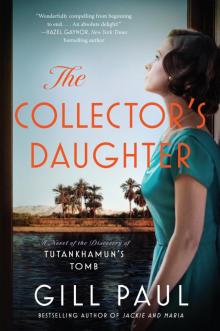 The Collector's Daughter
The Collector's Daughter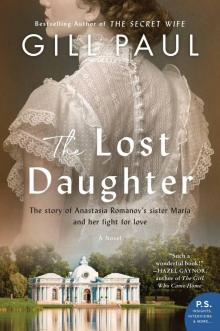 The Lost Daughter
The Lost Daughter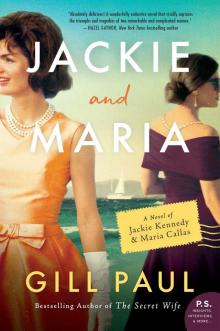 Jackie and Maria
Jackie and Maria The Affair
The Affair Love...Maybe
Love...Maybe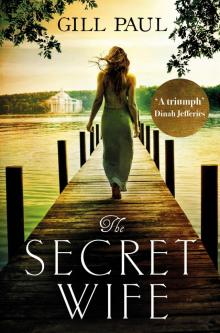 The Secret Wife
The Secret Wife No Place For a Lady
No Place For a Lady Another Woman’s Husband
Another Woman’s Husband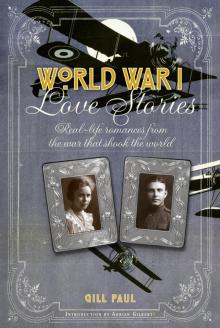 World War I Love Stories
World War I Love Stories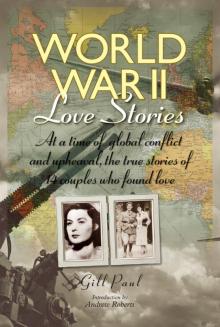 World War II Love Stories
World War II Love Stories